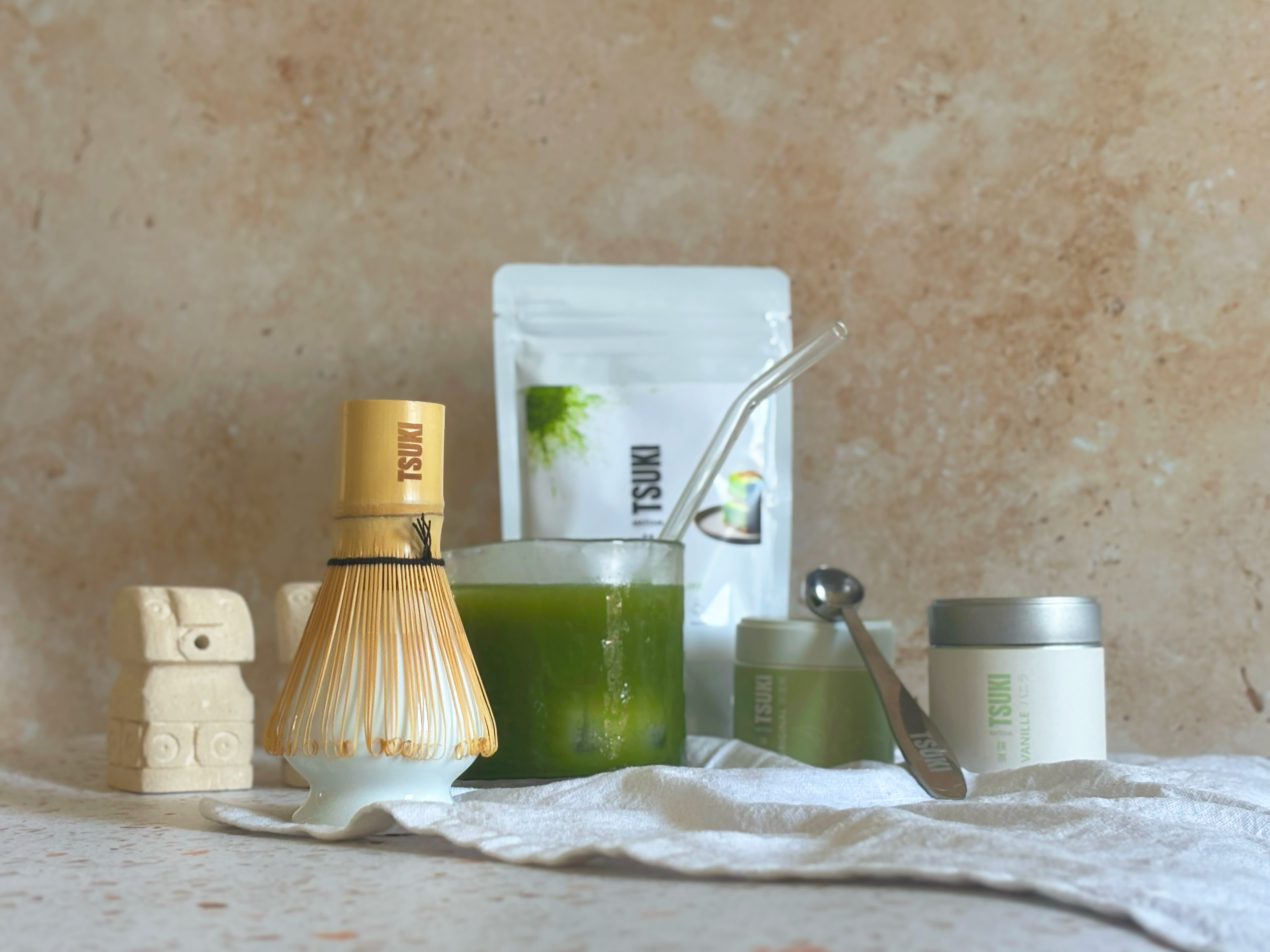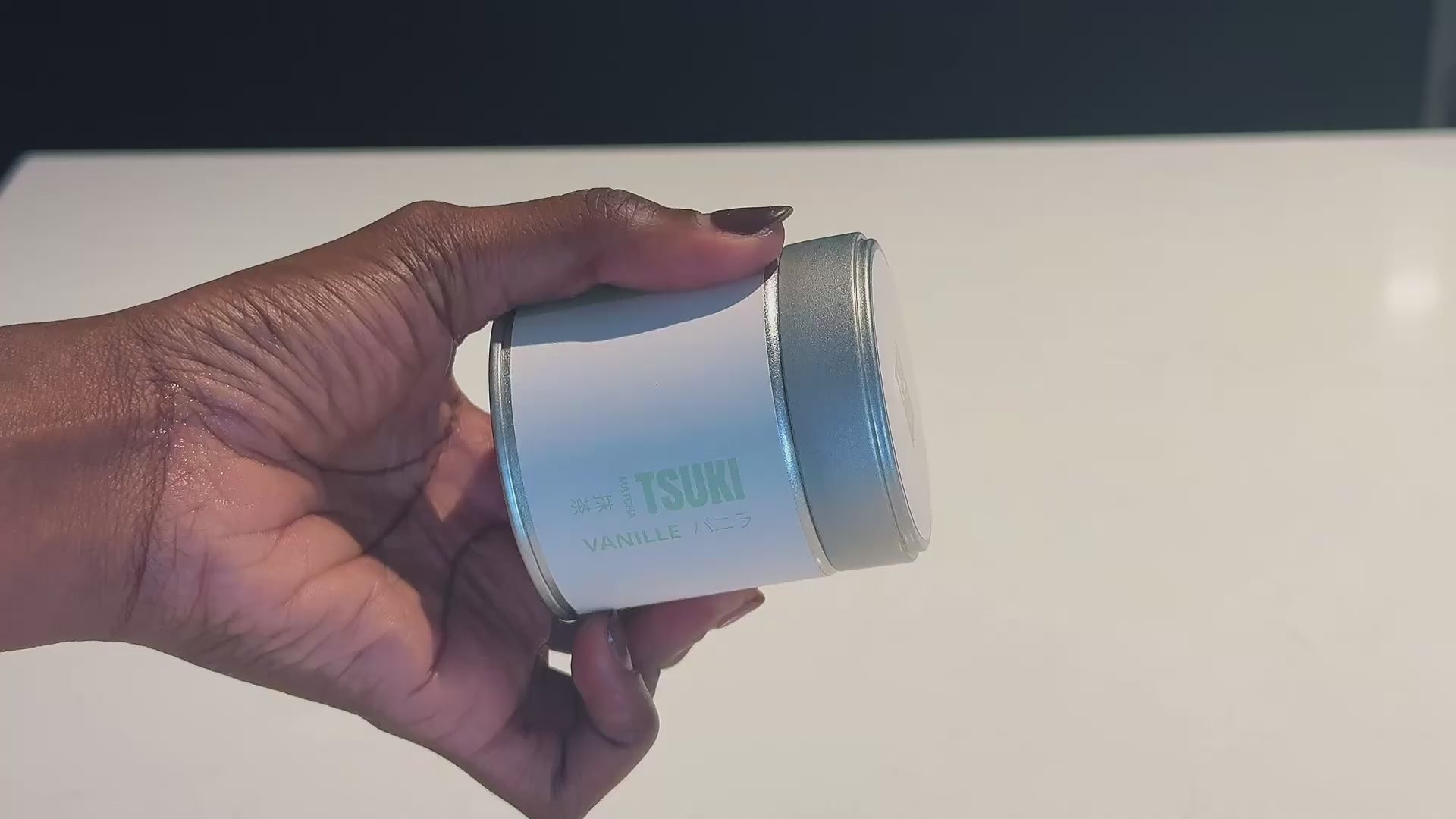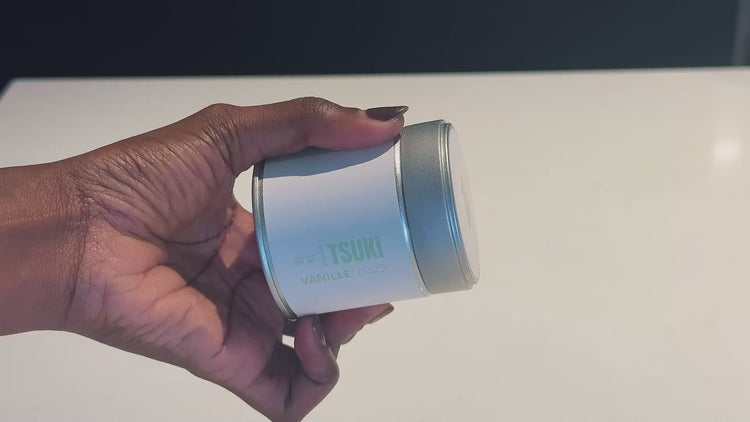
Which milk to choose for your matcha lattes? Full guide
Matcha is unlike any other beverage: it's a fine, vibrant powder made by grinding shaded green tea leaves. Every detail influences its taste: quality, storage, water temperature, utensils... and above all, milk. For a well-balanced latte, milk isn't just a complement, it's a real taste enhancer.
Chez TSUKI Matcha, on teste absolument tous les laits pour nos matcha latte.
D’abord en interne, lorsque nous élaborons des recettes.
Puis lors de nos événements, pop-ups et dégustations, où l’on prépare des lattes avec différents laits pour faire découvrir les nuances du matcha.
Et à chaque fois, la même surprise : le même matcha peut avoir un goût totalement différent selon le lait utilisé.
You may have already tasted a matcha latte that you didn't like... and then loved exactly the same matcha prepared with a different milk. Well, that's to be expected.
These reactions enabled us to understand to what extent:
- texture changes the balance,
- the taste of milk can amplify or soften the matcha,
- some beverages preserve antioxidants better than others.
That's why we've created this guide: to help you find the milk that reveals your matcha, according to your tastes and desires.
In this article, you'll discover how to choose the milk that best suits your tastes and desires.
Why does milk change the taste of matcha?

Each milk has its own personality:
Texture
– fluide → latte léger, matcha mis en avant
– épaisse → latte crémeux, gourmand (comme notre Smoothie Matcha Banane)
Taste
- neutral → no interference with matcha
- marked → gives a more gourmet direction
Nutrition
- vegetable → maximizes absorption of catechins (matcha's antioxidants)
- animal → may slightly reduce absorption
Depending on what you're looking for (benefits, taste, lightness, indulgence), the ideal milk won't be the same.
⭐ The milks we use in our tastings
In our workshops, tastings and pop-ups, we focus on three essential milks:
1. Lait d’avoine – Le grand favori
Probablement le lait le plus apprécié par nos clients et l’équipe TSUKI.
Pourquoi ?
- naturally creamy texture
- mild, neutral taste
- perfect for a balanced latte
- goes perfectly with our ceremonial matcha and our vanilla matcha
It's the best choice for a coffee-shop latte, smooth and comforting.
2. Rice milk - The secret to sublime matcha
The most underrated milk... yet one of the best for matcha.
Le lait de riz est :
– léger
– fluide
– délicatement sucré
– relativement neutre
This fluidity allows the matcha to express itself fully, without being weighed down.
Result:
✔️ very pure taste
✔️ light latte
✔️ no aromatic overload
✔️ ideal with the Matcha Ceremonial
At our events, this is often the surprise hit of the visitors' hearts.
3. Cow's milk - The tastiest, creamiest milk
Many people don't like plant milks, or simply want to rediscover the natural deliciousness of cow's milk. It's also the most practical milk, the one you almost always have in the fridge at home.
When to use it
– pour un rendu très crémeux
– pour une expérience plus gourmande
– pour les recettes comme le Matcha Onctueux à la fraise (voir la recette ici)
Its impact on benefits
Cow's milk contains casein, an animal protein that can bind with matcha's catechins. This does not remove the antioxidants, but the body absorbs them a little less.
In short, if your priority is to make the most of matcha's benefits, choose a plant-based milk. If your priority is taste and a creamier texture, cow's milk remains the most suitable option.
All plant milks: which one to choose for your latte?

We have tested a number of milks. Here are their specific features:
Oat milk
Oat milk remains one of the most popular choices. It brings a natural sweetness and creamy texture that envelops the matcha without masking its nuances. Its neutrality makes it perfect for a well-balanced latte with original matcha and vanilla matcha. It's a pleasant milk that's easy to use every day.
Rice milk
Rice milk is lighter and more fluid than oat milk. It offers a delicately sweet taste that fully respects the finesse of matcha. This is the milk that leaves the most room for the tea's aromas, making it an excellent choice for enhancing the flavors of matcha. our ceremonial matcha. It produces a luminous, fine and very pure latte.
Almond milk
Almond milk has a mild, slightly sweet flavor, with hints of walnut that add a gourmet touch. It goes very well with Vanilla matchaespecially if you like drinks that evoke desserts. However, it remains more aromatic than other milks, which influences the final taste of the latte.
Soy milk
Soy milk offers a dense texture and good protein content. It works very well in richer recipes or smoothies based on soy. culinary matcha. Its taste can be a little more pronounced, making it a suitable choice for hearty drinks rather than very delicate lattes.
Coconut milk
Avec ses notes exotiques et sa texture naturellement ronde, le lait de coco apporte une touche tropicale et gourmande. Il s’accorde parfaitement avec la matcha pour des desserts, des lattes glacés ou des cocktail comme notre Matchacolada. Son goût marqué peut cependant dominer les matchas plus subtils.
Pistachio milk
Creamy and delicately scented, pistachio milk offers a smooth, refined flavor. It creates a unique association with Vanilla matchaideal for those looking for a premium, original latte.
Cashew, macadamia or hazelnut milks
These rarer milks each have a different personality.
The cashew milk is very smooth and creamy, perfect for a round, comforting latte.
Macadamia milk, more delicate and almost buttery, sublimates the softer matchas like our ceremonial matcha.
Hazelnut milk, which is more aromatic, is better suited to dessert lattes or more gourmet recipes.
Which milk to choose for your TSUKI matcha?
| Matcha TSUKI | Recommended milks | Why |
|---|---|---|
| Matcha Cérémonial Original | Oats, Rice, Macadamia | These milks respect the finesse of matcha while providing a soft, balanced texture. Rice enhances the pure taste, oats add roundness and macadamia adds a delicate note. |
| Matcha Cérémonial Vanille | Almond, Pistachio, Oat | These milks naturally complement the sweet, vanilla notes. Almond and pistachio enhance the sweetness, while oats soften the whole without masking the aromas. |
| Culinary Matcha | Soy, Coconut, Almond | These milks are ideal for more creative recipes. Soy adds density, coconut adds an exotic touch, almond adds a gourmet note to smoothies and desserts. |
Discover all our matchas and accessories
FAQ - Bien choisir son lait pour un matcha latte
Peut-on préparer un matcha latte avec du lait froid ?
Oui, absolument. Pour un résultat homogène, commencez par délayer le matcha dans un peu d’eau tiède ou à température ambiante, puis ajoutez le lait froid. Vous obtiendrez ainsi un matcha latte glacé, rafraîchissant et idéal lorsque les températures montent.
Quel lait végétal privilégier en cas d’allergie aux fruits à coque ?
Si vous êtes allergique aux noix, tournez-vous vers des laits végétaux à base de céréales ou de légumineuses, comme l’avoine, le riz ou le soja. Leur goût doux et leur texture équilibrée mettent en valeur le matcha tout en garantissant une bonne dispersion de la poudre.
Peut-on associer plusieurs laits végétaux dans un matcha latte ?
Tout à fait. Mélanger différents laits végétaux permet d’ajuster à la fois la texture et le profil aromatique. Par exemple, l’association avoine et soja apporte une belle onctuosité et une mousse agréable, sans excès de sucre ni saveur dominante.
Conclusion: the best milk depends on you
There is no such thing as the "best" milk, only milk that is adapted to your needs:
✔️ For a pure, soft and luminous matcha: rice milk
✔️ For a balanced and stable latte: oat milk
✔️ For a very gourmet latte: cow's milk, almond or pistachio
✔️ To preserve a maximum of antioxidants: plant milks
✔️ For recipes: coconut, soy, almond
And for the best experience, a good latte starts with:
- a quality matcha
- a good emulsion
- the right utensils
Discover our matcha and accessories to prepare your best lattes at home.
👉 Coffret Matcha Complet - ideal as a gift or to treat yourself
👉 Matcha Cérémonial - the must-have for a top-of-the-range latte
👉 See all our products


















